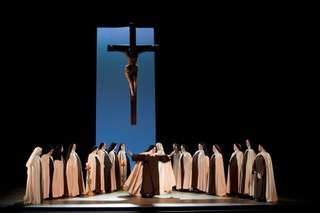|
Back
Singing overcomes staging Austin
Long Center for the Performing Arts
04/18/2009 - & April 22, 24, 26
Francis Poulenc: Dialogues des Carmélites
Scott Scully (Chevalier de la Force), David Small (Marquis de la Force), Emily Pulley (Blanche de la Force), Sheila Nadler (Madame de Croissy), Suzanne Ramo (Sœur Constance), Dana Beth Miller (Mère Marie), Jennifer Check (Madame Lidoine), Cindy Sadler (Mère Jeanne), Keely J. Rhodes (Sœur Mathilde), Holton Johnson (Thierry), Michael Lucus (M. Javelinot), Juliann Albaugh (Sœur Alice), Carol Brown (Sœur Anne), Melinda Brou (Sœur Antoine), Patricia Combs (Sœur Catherine), Angela Irving (Sœur Claire), Kimberly Pearce (Sœur Félicité), Lara Britton (Mère Gérald), Elizabeth Pétillot (Sœur Gertrude), Agnes Vojtko (Sœur Martha), Erika Wuerzner (Sœur St. Charles), Molly Wissinger (Sœur Valentine), Marcus McConico (père confesseur du couvent), Jason Slayden (premier commissaire), Matthew Arnold (second commissaire/officier/geôlier)
Austin Lyric Opera Orchestra and Chorus, Marc David Erck (chorus master), Richard Buckley (conductor)
Eric Einhorn (director), Harry Frehner, Scott Reid (set designers), Shawn Kaufman (lighting designer), Robert Dahlstrom (costume designer), Melanie Steele (hair/makeup designer)

(© Mark Matson/Austin Lyric Opera)
On Saturday night, Austin Lyric Opera’s general director Kevin Patterson stepped out before the curtain of Poulenc’s Dialogues des Carmélites with an announcement. No, no one was sick. Rather, with a point to the first balcony, Mr. Patterson graciously announced the presence of one Virginia Zeani, who created the role of Blanche in the opera’s 1957 world premiere in Milan (Italian version later revised). By the end of the night, most of the singers before her had done all they could to make her proud.
The one major exception, unfortunately, was soprano Emily Pulley in the very role Ms. Zeani created. The Texan’s assumption of Blanche faded into the background for most of the evening. Her vocal portrayal was consistent but one-dimensional and her attempt at depicting the fear-stricken Blanche was unconvincing in the first act. Maybe Pulley was unaware that Ms. Zeani was in the audience—surely this would have caused her some visible nerves!
Luckily, the rest of the Carmelite sisters sang at a very high level. Mezzo Sheila Nadler gave a gripping performance as Madame de Croissy, controlling every scene she was in and finding nuances in what can often be a blustery role. In the role of Madame Lidoine, soprano Jennifer Check suffered through some very boring blocking but made the most of it by showing off a solid top and fine legato.
Dana Beth Miller’s portrayal of Mère Marie almost lost control several times as the mezzo’s upper register soared throughout the house. Dramatically, though, it worked, as she created a Mère Marie that was more strict and commandeering than usual. The mezzo’s huge voice boomed, but Miller also managed to find intimacy and pathos during the latter scenes of the second act. Soprano Suzanne Ramo as Soeur Constance, however, gave the most complete vocal and dramatic performance of the night. Her full lyric voice projected a clear sound in all of her scenes with just the right touch of naïveté and femininity. Ramo was full of life in her Act One scene with Blanche and later showed a useful dramatic template in her disdain for her in the voting scene.
The men also proved reliable over the course of the evening. Baritone David Small commanded the first scene, and Matthew Arnold was particularly impressive in his three small roles. Texan Scott Sully acquitted himself well in his Austin debut as the Chevalier: the tenor’s sweet, light voice had an eerie effect when placed against Poulenc’s sweeping score, especially during his encounter with Blanche at the convent. Look for him to grow into larger roles with Austin and other companies.
Austin music director Richard Buckley led the ALO orchestra in one of their most complete performances in the last few seasons. Buckley did a super job of mitigating some of the smaller voices in the cast with the heavy Poulenc orchestration. The conductor also found great sensitivity in several scenes, notably the Blanche-Chevalier duet and the encounter between Mère Marie and Blanche in the second act.
The real disappointment of the night was the stage direction of Eric Einhorn. The New Jersey native’s interpretation had highlights but included long sections of dry interaction between the singers. Einhorn also played down some of the most important parts of the opera, notably the Act Two scene in which Soeur Constance takes the blame for the single dissenting vote for martyrdom. Constance’s shock at Blanche’s vote should be obvious to the audience, but instead it was watered down and moved to the side of the stage. In addition, Einhorn lacked perspective in his assignment of the set changes to the nuns. All night long, the Carmelites had to step out of character to move chairs and tables clumsily to and fro and then pretend to interact with them the next moment as if they hadn’t just picked them up and dragged them into the room. To his credit, Einhorn staged a chilling and perfectly synchronized finale. The reality of Dialogues, however, is that a strong final scene should be a prerequisite for any production of the Poulenc opera, not one of its few highlights.
Despite this and a not-quite-perfect Blanche, ALO’s production ofDialogues des Carmélites left more people than I could count wiping their eyes at the end of the night, which is exactly what this opera should do. With exemplary performances from Ramo and Miller, the voices managed to overcome the sometimes lackluster staging in what was a night to remember in Austin.
Austin Opera Website
Paul Wooley
|